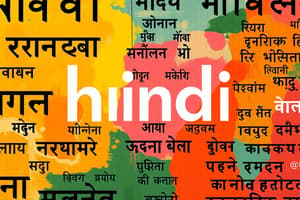Podcast
Questions and Answers
Which of the following best describes the grammatical structure of Hindi?
Which of the following best describes the grammatical structure of Hindi?
- Follows a Verb-Subject-Object (VSO) order.
- Employs a Subject-Object-Verb (SOV) order. (correct)
- Uses a Subject-Verb-Object (SVO) order.
- Adopts a Conjugated-Noun-Verb (CNV) order.
Which dialect of Hindi is considered the standard form?
Which dialect of Hindi is considered the standard form?
- Magahi
- Khari Boli (correct)
- Maithili
- Bhojpuri
What aspect of Hindi promotes communication across various linguistic communities in India?
What aspect of Hindi promotes communication across various linguistic communities in India?
- Its role in Indian cinema.
- Its limited vocabulary.
- Its status as a lingua franca. (correct)
- Its complex script.
Which of the following languages has NOT influenced Hindi vocabulary?
Which of the following languages has NOT influenced Hindi vocabulary?
What are essential elements to focus on when learning Hindi?
What are essential elements to focus on when learning Hindi?
Flashcards are hidden until you start studying
Study Notes
Overview of Hindi
- Hindi is an Indo-Aryan language.
- It is one of the official languages of India and serves as a lingua franca in northern and central India.
- Hindi is written in the Devanagari script.
Linguistic Features
- Phonetics: Consists of a set of vowels and consonants.
- Grammar:
- Follows Subject-Object-Verb (SOV) order.
- Noun cases include nominative, accusative, instrumental, dative, ablative, genitive, and locative.
- Uses gender (masculine and feminine) for nouns and adjectives.
- Vocabulary: Influenced by Sanskrit, Persian, Arabic, English, and other languages.
Dialects
- Several dialects, including:
- Khari Boli (standard Hindi)
- Awadhi
- Braj
- Bhojpuri
- Magahi
- Maithili
Usage
- Spoken by over 500 million people as a first language.
- Widely used in Indian cinema (Bollywood) and literature.
- Official language of the Indian government alongside English.
Cultural Significance
- Integral to Indian identity and culture.
- Used in major religious texts and modern Indian literature.
- Promotes communication across diverse linguistic communities in India.
Learning Hindi
- Resources include textbooks, online courses, language apps, and immersion programs.
- Focus on basic vocabulary, pronunciation, grammar rules, and conversational skills.
- Understanding of cultural context enhances language acquisition.
Overview of Hindi
- Hindi is an Indo-Aryan language spoken by over 500 million people as a first language.
- It is one of the two official languages of India, alongside English.
- It is a lingua franca in northern and central India.
- Hindi is written in the Devanagari script.
Linguistic Features
- Hindi has a set of vowels and consonants.
- It follows a Subject-Object-Verb (SOV) word order.
- Noun cases include nominative, accusative, instrumental, dative, ablative, genitive, and locative.
- Nouns and adjectives are gendered (masculine and feminine).
- Hindi vocabulary is influenced by Sanskrit, Persian, Arabic, English, and other languages.
Dialects
- There are several dialects of Hindi, including:
- Khari Boli (the standard dialect)
- Awadhi
- Braj
- Bhojpuri
- Magahi
- Maithili
Usage
- Hindi is widely used in Indian cinema (Bollywood) and literature.
- It plays a key role in promoting communication across diverse linguistic communities in India.
Cultural Significance
- Hindi is integral to Indian identity and culture.
- It is used in major religious texts and modern Indian literature.
Learning Hindi
- Resources for learning Hindi include textbooks, online courses, language apps, and immersion programs.
- Focus on basic vocabulary, pronunciation, grammar rules, and conversational skills.
- Understanding the cultural context will enhance your learning experience.
Studying That Suits You
Use AI to generate personalized quizzes and flashcards to suit your learning preferences.



